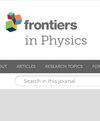A simple two-stage carrier-phase estimation algorithm for 32-QAM coherent optical communication systems
IF 1.9
3区 物理与天体物理
Q2 PHYSICS, MULTIDISCIPLINARY
引用次数: 0
Abstract
The combination of high-order modulation formats and linewidth-tolerant carrier phase estimation (CPE) can effectively improve spectrum efficiency and relax the limitation of laser linewidth. This paper presents a simple two-stage CPE algorithm for polarization-multiplexed (PM) 32-quadrature amplitude modulation (32-QAM) coherent optical communication systems. The algorithm uses an enhanced QPSK partitioning algorithm combined with a simplified 4th power CPE method for coarse estimation in the initial stage and maximum likelihood (ML) detection in the subsequent fine stage. The CPE algorithm significantly increases the number of symbols used in the first stage of coarse estimation. This results in a significant increase in the stability and reliability of the phase estimation, and the CPE algorithm significantly reduces the computational complexity. The optimal parameters, phase estimation performance, and system performance of the algorithm were investigated by building a 22 Gbaud PM 32-QAM coherent system simulation platform and a 5 Gbaud PM 32-QAM coherent system experimental platform. The results show that the proposed two-stage CPE algorithm has a stronger linewidth tolerance difference than the conventional QPSK, and the two-stage CPE algorithm with an optimal block length of 105 performs comparable to blind phase search (BPS). The optical signal noise Ratio (OSNR) value is 21.2 dB and the bit error rate (BER) is 1.8 × 10用于 32-QAM 相干光通信系统的简单两级载波相位估计算法
高阶调制格式与线宽容限载波相位估计(CPE)相结合,可有效提高频谱效率,并放宽激光线宽的限制。本文针对偏振多路复用(PM)32-正交振幅调制(32-QAM)相干光通信系统提出了一种简单的两阶段 CPE 算法。该算法采用增强型 QPSK 分区算法,结合简化的第四功率 CPE 方法,在初始阶段进行粗估计,在随后的精细阶段进行最大似然 (ML) 检测。CPE 算法大大增加了第一阶段粗估计所使用的符号数量。这大大提高了相位估计的稳定性和可靠性,CPE 算法还显著降低了计算复杂度。通过构建 22 Gbaud PM 32-QAM 相干系统仿真平台和 5 Gbaud PM 32-QAM 相干系统实验平台,研究了该算法的最优参数、相位估计性能和系统性能。结果表明,与传统 QPSK 相比,所提出的两级 CPE 算法具有更强的线宽容差,最佳块长度为 105 的两级 CPE 算法的性能与盲相位搜索(BPS)相当。最佳块长度为 105 时,光信号噪声比(OSNR)值为 21.2 dB,误码率(BER)为 1.8 × 10-3。具有灵活方案和良好通信性能的接收端 DSP 单元将在自适应弹性光网络中得到潜在应用。
本文章由计算机程序翻译,如有差异,请以英文原文为准。
求助全文
约1分钟内获得全文
求助全文
来源期刊

Frontiers in Physics
Mathematics-Mathematical Physics
CiteScore
4.50
自引率
6.50%
发文量
1215
审稿时长
12 weeks
期刊介绍:
Frontiers in Physics publishes rigorously peer-reviewed research across the entire field, from experimental, to computational and theoretical physics. This multidisciplinary open-access journal is at the forefront of disseminating and communicating scientific knowledge and impactful discoveries to researchers, academics, engineers and the public worldwide.
 求助内容:
求助内容: 应助结果提醒方式:
应助结果提醒方式:


